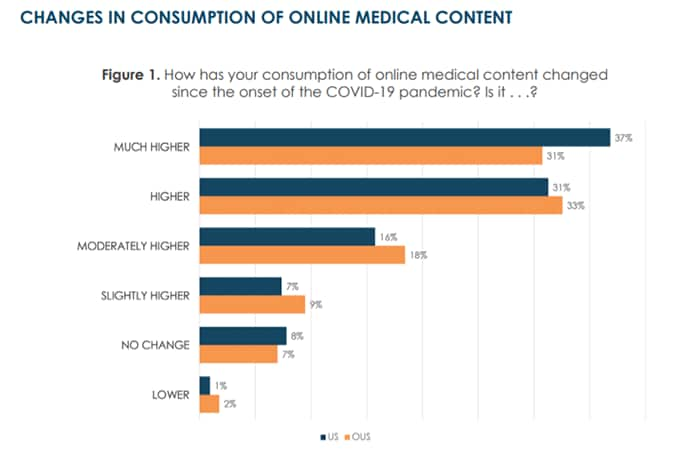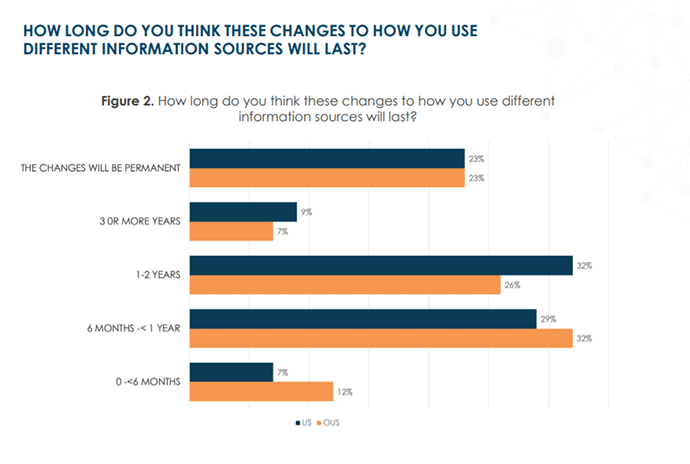Nearly two thirds of physicians worldwide report a significant increase in the consumption of online medical content since the COVID-19 pandemic began, and about a quarter predict that changes in the way they are accessing such content will be permanent.
Those are two key findings from a white paper based on an online Medscape market research survey of 8175 physicians that was conducted from May 13 to 19, 2020. The goal was to assess physicians’ perceptions and experiences related to the COVID-19 pandemic.
The majority of respondents (6781) practiced outside of the United States, and the remaining 1394 practiced in the United States. They had a wide range of practice experience. Specifically, 14% had been in practice for 1 to 5 years, 10% for 6 to 10 years, 19% for 11 to 20 years, 25% for 21 to 30 years, and 32% for more than 30 years.
The top three practice settings in which respondents practiced were a hospital (45%), an office-based solo practice (13%), and an office-based single-specialty group practice (10%).
Among all respondents, 64% said that their consumption of online medical content was “much higher” or “higher” compared with prepandemic levels.

In the United States, the largest increase in online use was among cardiologists (66% of respondents), primary care physicians (66% of respondents), and physicians who practice in less common specialties (an aggregated 70% of respondents). The lowest increase in use was among oncologists (47% of respondents).
Outside the United States, the largest percentage increase in online use of medical content (much higher/higher) was in Mexico (72% of respondents); the lowest increase was in Italy (55% of respondents).
About half of respondents (51%) said they expect to increase their use of professional apps and for physicians and healthcare providers as a result of the COVID-19 pandemic. In the United States, the largest increase is expected among endocrinologists (58%), and the lowest is expected among neurologists (22%) and oncologists (22%).
Outside the United States, the largest increase is expected among cardiologists (55%) and primary care physicians (56%); the lowest is expected among neurologists (47%).
After the Pandemic
Respondents also expect that after the pandemic, there will be an extended shift away from traditional in-person means of communication and information exchange to entirely digital platforms through medical websites. For example, 59% expect a decrease in in-person conferences, and 67% expect an increase in virtual conferences.
At the same time, 63% expect a decrease in in-person meetings with pharmaceutical representatives, whereas 37% expect an increase in virtual meetings with pharmaceutical representatives.
When survey participants were asked how long they thought such changes regarding how they use different information sources will last, 11% said up to 6 months, 31% said 6 months to less than 1 year, 27% said 1 to 2 years, 8% said 3 or more years, and 23% expected the changes to be permanent.

“From an educational perspective, the COVID-19 pandemic has opened up numerous doors that were not previously opened, including an astronomical growth in online learning, the national and international meetings being converted into virtual meetings online, and an enormous explosion of online education through portals like Medscape,” James L. Januzzi, MD, a cardiologist at Massachusetts General Hospital, Boston, said in an interview as part of the report.
Another interviewee, Mark S. Silverberg, MD, PhD, FRCPC, a Toronto, Canada–based gastroenterologist, characterized this current moment as an “opportunity to embrace new technologies to make medicine and healthcare more efficient and more tech-friendly.”
According to the white paper, the Medscape Professional Network is the most visited website for professional medical information by US physicians and by physicians in the five largest European Union countries (United Kingdom, Germany, France, Italy, and Spain).
Since the beginning of the pandemic, online traffic to Medscape has increased as healthcare professionals consumed information on COVID-19 as well as a broad range of non-COVID-19 content.
The number of unique visitors to the Medscape website in the European Union and the United States essentially doubled in March 2020 compared with March 2019. In the European Union, for example, the editorial page view was up 75% in March 2020 and 57% in April 2020 compared with the same months in 2019.
“The digital transformation in the healthcare and pharmaceutical industries was accelerated during the coronavirus pandemic,” the report concludes.
“The key opinion leaders and industry experts agree that in the post-pandemic world, even as lockdowns are lifted and restrictions relaxed, the emerging trends for an increase in digital communications will stay.
“Telemedicine, virtual meetings and conferences, and online professional education will play an even greater part. Physicians will continue obtaining the latest medical news and expert perspectives, essential point-of-care drug and disease information, and continuous medical education from medical websites.”
Follow Medscape on Facebook, Twitter, Instagram, and YouTube.
